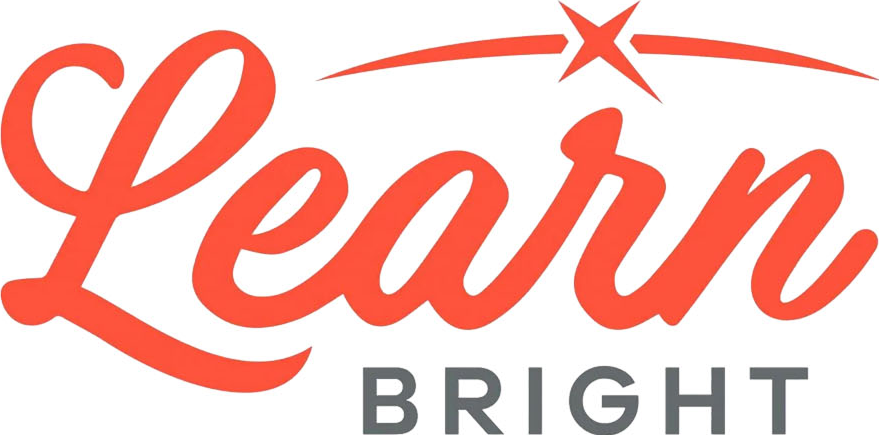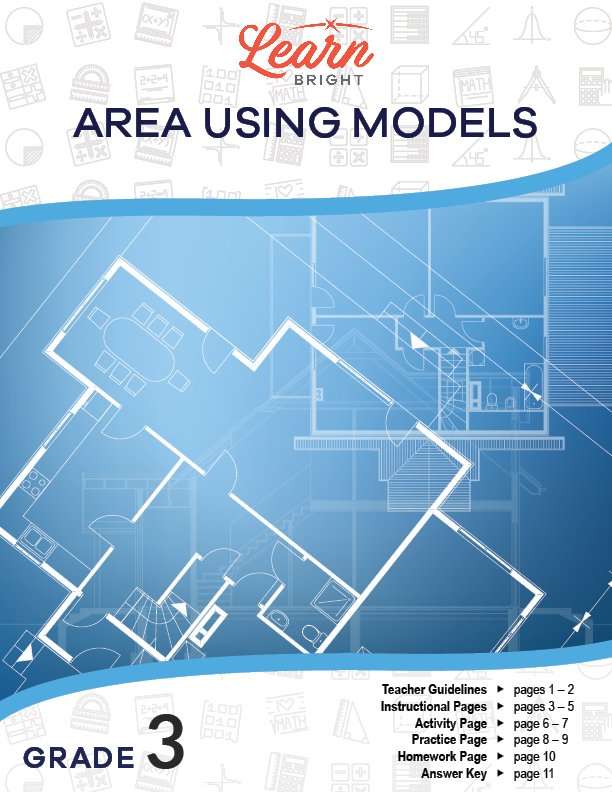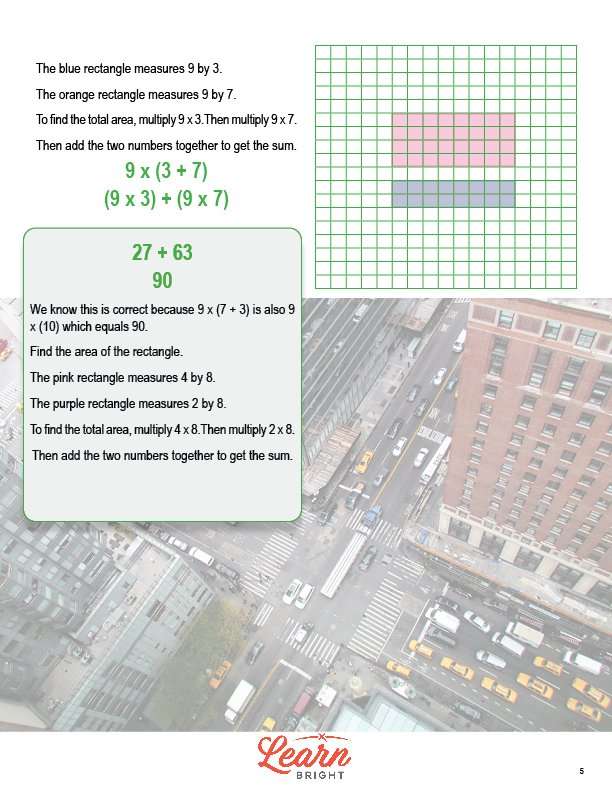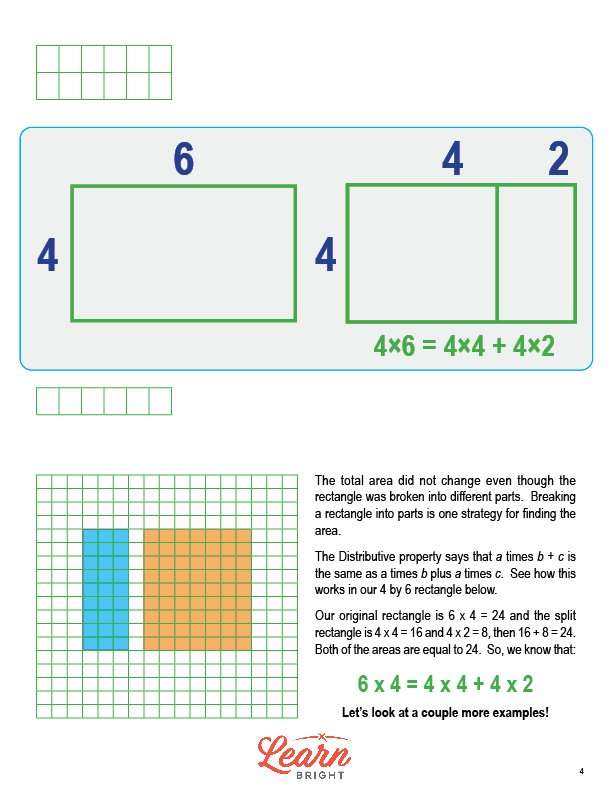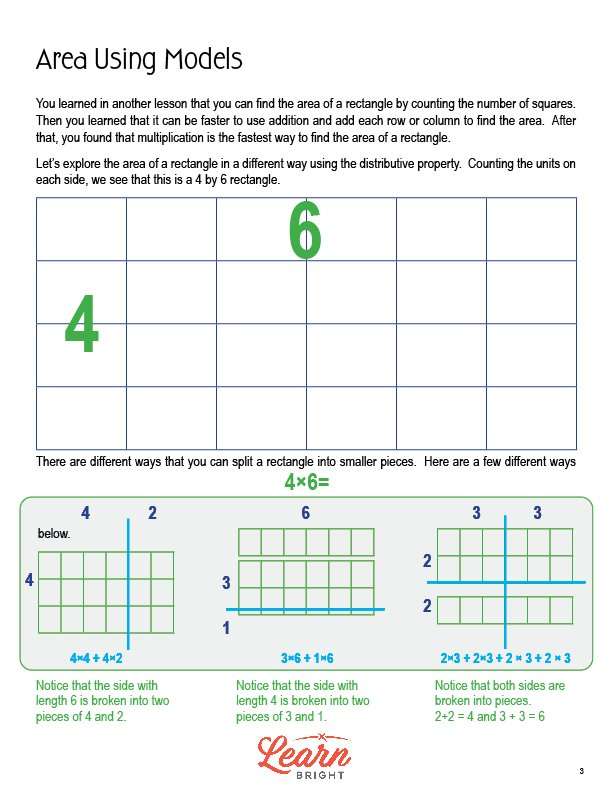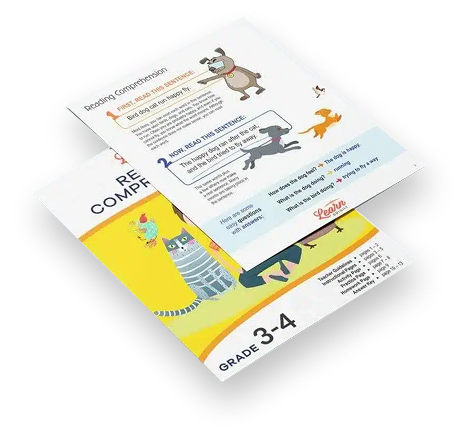Description
What our Area Using Models lesson plan includes
Lesson Objectives and Overview: Area Using Models teaches students how to use some mathematical models that use area. At the end of the lesson, students will be able to use tiling to show that the area of a rectangle with whole number side lengths a and b + c is the sum of a x b and a x c. Students will be able to connect the distributive property to the area model. This lesson is for students in 3rd grade.
Classroom Procedure
Every lesson plan provides you with a classroom procedure page that outlines a step-by-step guide to follow. You do not have to follow the guide exactly. The guide helps you organize the lesson and details when to hand out worksheets. It also lists information in the blue box that you might find useful. You will find the lesson objectives, state standards, and number of class sessions the lesson should take to complete in this area. In addition, it describes the supplies you will need as well as what and how you need to prepare beforehand. The supplies you will need for this lesson are colored pencils or markers and the handouts. To prepare for this lesson ahead of time, you can gather the supplies and copy the handouts.
Options for Lesson
Included with this lesson is an “Options for Lesson” section that lists a number of suggestions for activities to add to the lesson or substitutions for the ones already in the lesson. One optional addition to this lesson is to have students make as many area models as they can for multiplication expression. You can also have your students compare the factors of a number with the area models to link those two concepts together. Another suggestion is to have students use perler beads to create area models. Finally, you could assign students a multiplication expression for the activity or let them choose their own.
Teacher Notes
The teacher notes page includes a paragraph with additional guidelines and things to think about as you begin to plan your lesson. This page also includes lines that you can use to add your own notes as you’re preparing for this lesson.
AREA USING MODELS LESSON PLAN CONTENT PAGES
Area Using Models
The Area Using Models lesson plan includes three content pages. The lesson begins by reminding students that they’ve already learned how to find the area of a rectangle by counting the number of squares, by using addition, and by using multiplication (and that using multiplication is the fastest way!). However, you can also find the area of a rectangle using the distributive property. The lesson provides an example of a 4 x 6 rectangle. You can split this rectangle into smaller pieces. The lesson lists a few different ways, like splitting it into a 4 x 4 piece and a 4 x 2 piece, 3 x 6 and 1 x 6, or even 2 x 3, 2 x 3, 2 x 3, and 2 x 3! To find the total area using this method, you find the area of each smaller piece and add them together. This does not change the total area.
This method uses the distributive property. The distributive property says that a times b = c is the same as b + a times c. The lesson includes an example to illustrate this concept. The original rectangle in the example is 6 x 4 = 24. The split rectangles are 4 x 4 = 16 and 4 x 2 = 8, and 16 + 8 = 24.
The lesson then delves into a few more examples of this concept. Each example illustrates how you can use this method to find the total area of a rectangle.
AREA USING MODELS LESSON PLAN WORKSHEETS
The Area Using Models lesson plan includes three worksheets: an activity worksheet, a practice worksheet, and a homework assignment. You can refer to the guide on the classroom procedure page to determine when to hand out each worksheet.
FOUR WAYS ACTIVITY WORKSHEET
For the activity worksheet, students will write a multiplication expression in the box, and then show four different ways to break the numbers apart to find the solution to the expression. For each of the four ways, they will also draw the area model and label each piece.
MULTIPLICATION EXPRESSIONS PRACTICE WORKSHEET
The practice worksheet asks students to write a multiplication expression for each of the given area models. They will then solve for the area.
AREA USING MODELS HOMEWORK ASSIGNMENT
For the homework assignment, students will answer multiple area questions using the provided models. This will test their knowledge and understanding of the lesson material.
Worksheet Answer Keys
This lesson plan includes answer keys for the activity worksheet, the practice worksheet, and the homework assignment. If you choose to administer the lesson pages to your students via PDF, you will need to save a new file that omits these pages. Otherwise, you can simply print out the applicable pages and keep these as reference for yourself when grading assignments.
